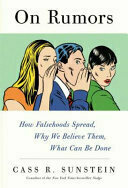
Many of us are being misled. Claiming to know the “pals” of presidential aspirants, dark secrets about public officials, and hidden causes of the current economic crisis, those who spread rumors know precisely what they are doing. They are sometimes able to derail political candidates, injure companies and reputations, even damage democratic governance. And in the era of the Internet, they know more about manipulating the mechanics of false rumors—social cascades, group polarization, and biased assimilation—than you do. They also know that the presumed correctives—publishing balanced information, issuing corrections, and trusting to the marketplace of ideas—do not always work. A pioneer in the effort “to design regulation around the ways people behave” (The Wall Street Journal), Cass R. Sunstein uses examples from the real world and from behavioral studies to explain why certain rumors spread like wildfire and what we can do to avoid being misled.